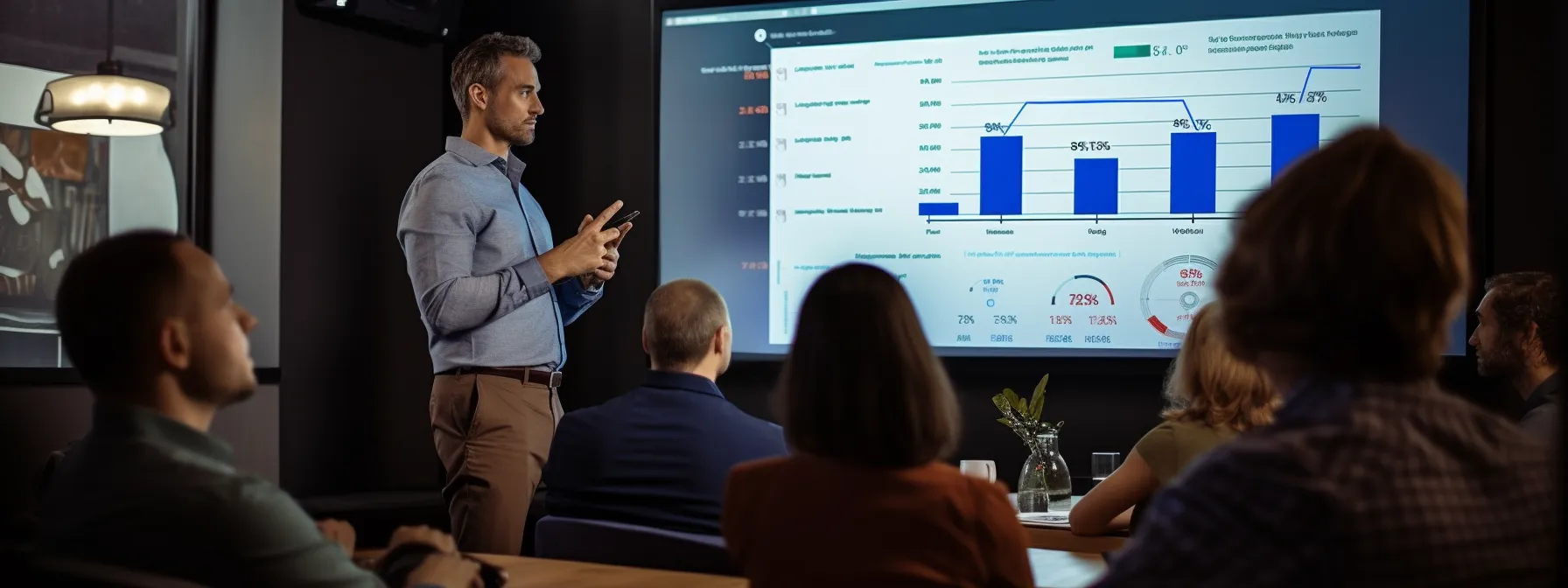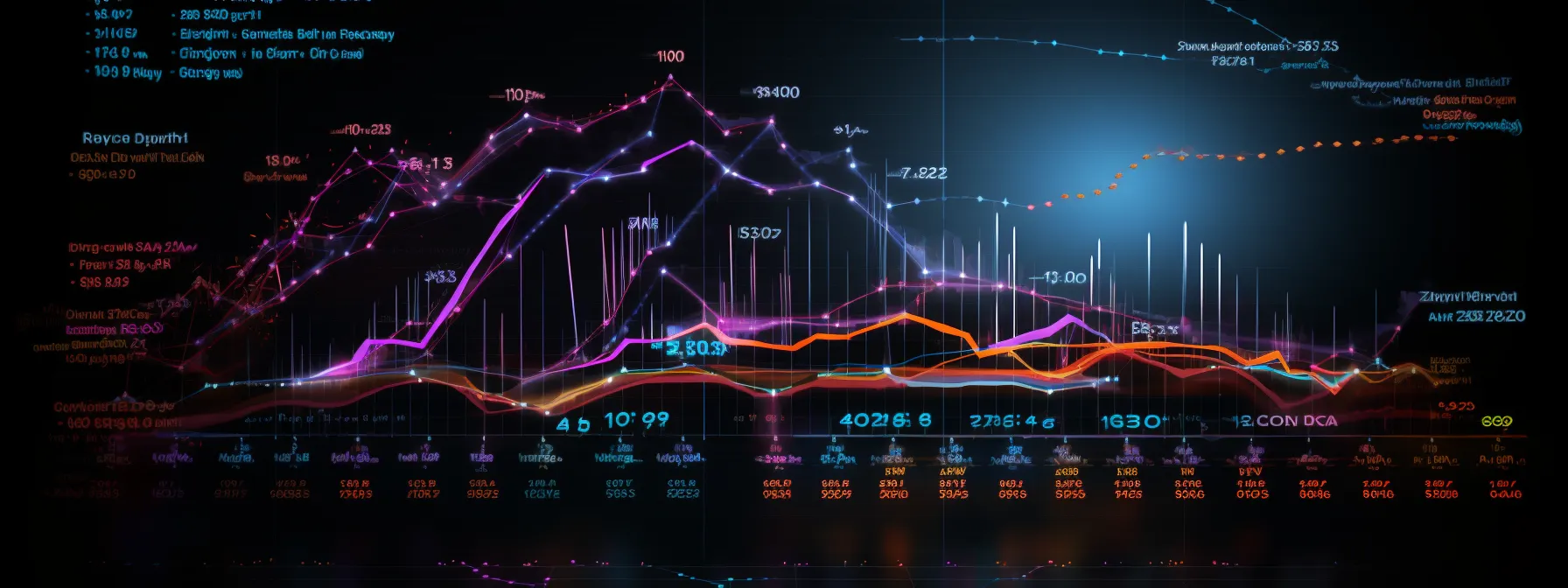Mastering SEO Reporting: Advanced Techniques for Enhanced Learning
In the dynamic world of search engine optimization, the ability to distill complex data into comprehensive SEO reports is a pivotal skill for professionals.
Effective SEO reporting transcends mere numbers, offering a narrative that reveals the performance of a website in search results and the factors influencing its ranking.
By mastering advanced SEO reporting techniques, marketers can unlock actionable insights, maneuver through the intricacies of search engine algorithms, and refine their SEO strategy.
Recognizing the significance of competitive analysis and data visualization can further augment one’s reporting capabilities, enabling SEO agencies to deliver reports that not only resonate with clients but also drive strategic decisions.
Keep reading to discover how advanced SEO reporting can transform your approach to interpreting data and informing your next moves in the digital landscape.
Key Takeaways
- SEO reporting is crucial for measuring progress and articulating performance in search engine optimization
- Customization is key when creating SEO reports to ensure the information is relevant and aligned with the recipient’s objectives
- Visual representation in SEO reporting, such as charts and graphs, helps to highlight trends and patterns for strategic decision-making
- Competitive analysis within SEO reports allows marketers to benchmark their performance against industry leaders and identify areas for optimization
- Deep analysis of page-level analytics and the strategic optimization of content for SERP features can enhance online visibility and increase user engagement
Unveiling the Layers of Effective SEO Reporting

In the realm of search engine optimization, the ability to measure progress and articulate performance is as critical as the strategies themselves.
Mastering SEO Reporting is not merely about collecting data; it involves careful identification of SEO goals and the key performance indicators (KPIs) that will chart the path toward those objectives.
It extends further into the art of crafting and customizing these intricate reports for varied audiences, ensuring that stakeholders – whether they are technical experts, marketing teams, or business executives – can glean actionable insights that are relevant and meaningful to their respective roles.
This dual focus sets the stage for SEO reports that not only track the SEO efforts meticulously but also resonate with decision-makers, fostering informed decisions and strategic adjustments.
Elevate Your Visibility: Unlock SEO Success Today!
Identifying Your SEO Goals and KPIs
Embarking on the search engine optimization journey necessitates clarity in defining what success looks like. SEO goals typically encapsulate heightened search traffic, improved keyword rankings, or enhanced engagement metrics like click-through rates (CTR) and bounce rates, providing a north star for your SEO strategy.
With these targets in sight, pinpointing the appropriate KPIs becomes the linchpin of effective performance tracking. These indicators encompass metrics such as search rankings for target keywords, the volume and quality of backlink profiles, and site audit outcomes, which collectively paint a comprehensive picture of SEO health.
Tailoring Reports for Different Audiences
SEO reports are not one-size-fits-all documents and their effectiveness hinges on customization. When approaching different stakeholders, SEO professionals craft reports with the audience in mind, ensuring that the information presented is relevant, comprehensible, and aligned with the concerns and objectives of the recipient.
For example, technical teams may require in-depth analyses of site audits, crawler data, and XML sitemaps, while C-level executives might prioritize a distilled view that centers on SEO performance, competitive advantage, and overall impact on revenue. Tailoring reports in such a way optimizes communication and fosters strategic data-driven actions.
Harnessing Data Visualization for Impactful SEO Insights

Visual representation forms the backbone of effective SEO reporting, converting raw data into comprehensible insights.
When optimized, the selection of charts and graphs can transcend basic understanding to highlight trends and patterns that fuel strategic decision-making.
This visual transition is not passive; it requires deliberate choices in color schemes and design elements that can draw attention to pivotal information.
Charting the course for this transformative process, professionals employ visualization methods to ensure that key metrics, such as keyword ranking progressions and backlink analysis, are not only accurately reported but underscored in a manner that invokes actionable responses.
Choosing the Right Charts and Graphs for Your Data
In the tapestry of SEO reporting, the astute selection of visualization tools serves to demystify complex datasets. Graphical elements like line graphs for showcasing keyword ranking trends over time, or pie charts to represent the distribution of search traffic sources, empower a narrative that aligns with the contours of one’s data story.
Effective chart utilization transforms a mundane SEO reporting tool into an engaging narrative device. Bar graphs might excel in comparing domain authority across a competitive set, while scatter plots could reveal the correlation between page load times and bounce rates, underscoring the multifaceted nature of data-driven decisions.
Utilizing Color and Design to Highlight Key Findings
Employing color and design intensifies the interpretive power of SEO reporting tools. Strategic use of color schemes coupled with intuitive design elements directs the viewer’s attention, effectively differentiating between data points and amplifying critical insights.
| SEO Metric | Q1 | Q2 | Q3 | Q4 |
|---|---|---|---|---|
| Organic Search Traffic | 30% | 45% | 50% | 65% |
| Keyword Ranking Improvement | 20% | 35% | 40% | 55% |
| Bounce Rate Reduction | 5% | 10% | 15% | 25% |
Design extends beyond aesthetic appeal, serving as a functional agent that structures complex data into digestible segments. By shaping information through a clear design hierarchy, SEO professionals can craft reports that not only engage but also facilitate immediate understanding and prompt decision-making.
Incorporating Competitive Analysis Into SEO Reports

In today’s competitive digital landscape, an astute understanding of one’s market position is imperative for crafting a robust SEO strategy.
The incorporation of competitive analysis within SEO reports is a powerful tactic that allows marketers to dissect the ranking intricacies and strategic maneuvers of their rivals.
By tracking competitors’ rankings and strategies and benchmarking their own performance against industry leaders, businesses can identify opportunities for optimization and align their SEO efforts with the ever-evolving demands of search engines.
This analytical approach not only sharpens the focus on areas needing attention but also elicits a blueprint for surpassing competitors in search engine results pages (SERPs).
Tracking Competitors’ Rankings and Strategies
In the quest to dominate SERPs, SEOTheory elucidates the significance of monitoring not only one’s search engine standings but also the positioning of competitors. This imperative endeavor of tracking reveals the shifts and trends within the market, offering insight into both the successes and lapses of those sharing your digital space.
SEOTheory emphasizes that understanding how rivals perform for a spectrum of keywords and the strategies they employ can inform and refine one’s site optimization tactics. Through meticulous competitor research, SEO practitioners are equipped to adjust and pivot their SEO strategies effectively, carving out a more authoritative presence in their industry’s search results.
Benchmarking Your Performance Against Industry Leaders
At SEOTheory, understanding where one stands in relation to the top performers in the industry is not just insightful, it’s transformative. Benchmarking enables an objective measurement of a website’s SEO performance against industry heavyweights, offering a clear perspective on what excellence looks like and which elements warrant attention or recalibration.
| SEO Benchmarking Metric | Your Site | Industry Leader |
|---|---|---|
| Keyword Ranking Positions | Top 50 | Top 10 |
| Organic Search Traffic | 5,000 visits/month | 50,000 visits/month |
| Backlink Count | 300 | 3,000 |
| Domain Authority Score | 35 | 75 |
SEOTheory explicates that to continually elevate search engine optimization tactics, agencies and marketers should leverage benchmarking not as a static report, but as a dynamic instrument for growth. This practice is pivotal in delineating gaps to forge strategies that not only compete but also set a new standard for SEO excellence within one’s specific market segment.
Advancing Beyond Basic Metrics With Deep Dives

Progressing in the field of search engine optimization requires a deeper understanding of complex performance metrics and their implications for developing a robust content strategy.
Experienced SEO professionals recognize the importance of dissecting page-level analytics to fine-tune a site’s contents, alongside strategies to exploit the nuances of Search Engine Results Pages (SERPs) for increased visibility.
This analytical proviso involves a perspicacious approach to content adjustments informed by granular data and the tactical deployment of SERP features, ensuring an optimized online presence capable of achieving higher organic reach.
Dissecting Page-Level Analytics for Content Strategy
Deep analysis of page-level analytics stands at the heart of sophisticated content strategy development within SEO. By investigating metrics such as bounce rate, time on page, and user interaction for individual web pages, SEO professionals can pinpoint specific content elements that resonate with their audience and those that require optimization.
Empowering an evidence-based approach, dissection of granular page data enables the refinement of landing pages and tailoring of user experience to align with intent, driving a more engaged and conversion-centric visitation flow. This level of scrutiny accentuates the intricacies of SEO work, where each web page becomes a focal point for strategic enhancement.
Exploiting SERP Features to Maximize Visibility
SEOTheory underscores the pivotal role of SERP features in enhancing online visibility. By strategically optimizing content to align with rich snippets, local pack listings, or featured answers, websites gain a competitive edge in attracting user attention directly within the search engine results page.
The astute integration of these advanced SEO techniques often results in increased click-through rates and heightened user engagement. This optimization includes crafting content to meet the parameters for featured snippets, thus positioning it prominently at the top of search results:
| SEO Feature | Implementation Tactic | Impact on Visibility |
|---|---|---|
| Featured Snippets | Structured Data Optimization | Direct Answer Placement |
| Local Pack | Local SEO and Citations | Increased Local Discovery |
| Image Pack | Image Alt Text and File Naming | Enhanced Image Search Presence |
SEOTheory propels marketers towards leveraging these elements, guiding them through the nuances of tailoring content to the requirements of different SERP features. This tactical adjustment not only amplifies a website’s visibility but also strives to outpace competitors in the quest for user attention and engagement.
Automating Reports to Save Time and Increase Efficiency

In pursuit of operational excellence, SEO professionals continually seek methodologies that can streamline their workflow while ensuring that their reports retain a superior level of precision and insight.
The transition to automated reporting systems signifies a strategic move that can save precious time for SEO agencies and marketing departments, allowing them to reallocate efforts towards optimization and strategy development rather than manual data compilation.
This pursuit of efficiency is not without its challenges, as the selection of capable and reliable tools for automated reporting becomes a pivotal decision in enhancing the SEO process.
Selecting the Best Tools for Automated Reporting
In the landscape of SEO, the impetus for leveraging sophisticated automated reporting tools is undeniable. SEO professionals, guided by SEOTheory’s comprehensive teachings, must discern which tools will not only streamline their reporting process but also enrich their analysis with accuracy and actionable insights.
It is crucial that the chosen SEO reporting tools integrate seamlessly with data sources such as Google Analytics, search console, and backlink analysis platforms, to provide a cohesive overview of SEO performance. When embarking on this selection, the imperative lies in identifying tools with robust features that support a range of data integrations, ensuring comprehensive and timely SEO reports.
Streamlining Workflow with Effective Communication Strategies
In the realm of advanced SEO reporting, the importance of efficient communication cannot be overstated. SEO professionals often find themselves working across diverse teams and stakeholders, each with unique needs and perspectives.
Mastering communication strategies ensures that the insights derived from SEO reports are not only accurate but also effectively communicated to drive collaboration and informed decision-making.
Crafting reports with a narrative that resonates with technical experts, marketing teams, and executives alike requires a nuanced approach. Professionals must go beyond data analysis to provide contextual understanding, explaining the implications of SEO performance on broader business objectives.
By adopting a clear and concise communication style, SEO experts can bridge the gap between technical intricacies and strategic goals, fostering a collaborative environment that propels the SEO strategy forward.
Furthermore, the utilization of collaborative tools and platforms for sharing and discussing reports enhances real-time communication. Implementing feedback loops ensures that any necessary adjustments can be made promptly, promoting an agile approach to SEO strategy refinement.
In this interconnected digital landscape, effective communication emerges as a linchpin for success, allowing SEO professionals to translate data-driven insights into actionable strategies.
Navigating Algorithmic Changes for Sustained SEO Success
In the ever-evolving landscape of search engine algorithms, staying abreast of changes is imperative for sustained SEO success. Advanced SEO reporting goes beyond static metrics by delving into the dynamics of algorithmic shifts, enabling professionals to adapt strategies in real-time.
Understanding the nuances of major algorithm updates, such as Google’s core updates or changes in ranking criteria, empowers SEO practitioners to proactively adjust their approaches. This involves continuous monitoring of industry publications, algorithm tracking tools, and staying engaged with SEO communities to glean insights into emerging trends.
Moreover, advanced SEO reporting incorporates the analysis of historical data to identify correlations between algorithmic changes and fluctuations in website performance. By establishing these connections, professionals can discern patterns and develop strategies that not only weather algorithmic shifts but also position websites for long-term success.
Ethical Considerations in SEO Reporting: Transparency and Accountability
As SEO reporting takes center stage in digital marketing strategies, ethical considerations become paramount. Transparency and accountability are foundational principles that underpin the credibility of SEO professionals and agencies.
Ensuring that SEO reports accurately represent the methods employed, the sources of data, and the limitations of analysis is essential. Transparent reporting builds trust with clients and stakeholders, demonstrating a commitment to providing an honest representation of SEO performance.
This includes clearly communicating the difference between organic growth and paid promotions, as well as disclosing any potential conflicts of interest.
Accountability in SEO reporting extends beyond data accuracy to ethical practices in link building, content creation, and other optimization strategies. Professionals must adhere to industry standards and search engine guidelines, steering clear of manipulative tactics that could lead to penalties.
By embracing ethical considerations in SEO reporting, professionals contribute to the integrity of the industry while building lasting relationships with clients based on trust and reliability.
Leveraging User Experience Metrics for SEO Excellence
In the intricate landscape of SEO, user experience (UX) metrics emerge as a critical dimension that goes beyond traditional performance indicators. Mastering the incorporation of UX metrics into advanced SEO reporting provides a holistic understanding of how website visitors interact with content and interfaces, ultimately influencing search engine rankings.
Advanced SEO reporting delves into user-centric metrics such as dwell time, click-through rates, and mobile responsiveness. By analyzing these metrics alongside traditional SEO indicators, professionals can uncover insights into the alignment between user intent and the content offered.
This nuanced approach allows for strategic adjustments to enhance the overall user experience, leading to increased engagement, reduced bounce rates, and improved search engine visibility.
Furthermore, the integration of UX metrics fosters a synergy between SEO and web design teams. By collaborating to interpret data on user behavior, these teams can implement design enhancements that not only meet SEO goals but also elevate the overall website experience.
In the pursuit of SEO excellence, understanding and optimizing for user experience becomes a pivotal factor that goes beyond keyword rankings and backlink profiles.
Frequently Asked Questions
How can SEO reporting help in optimizing website performance and increasing organic traffic?
SEO reporting plays a pivotal role in optimizing website performance by providing in-depth analysis and actionable insights, which allows SEO professionals to understand areas of improvement and track progress. By analyzing organic traffic trends and leveraging data from these reports, strategies can be refined to attract more visitors and improve ranking on search engine results pages.
Elevate Your Visibility: Unlock SEO Success Today!
What are the key elements of an effective seo report that provide valuable insights?
An effective SEO report must encapsulate comprehensive data integrations, showcasing key performance indicators (KPIs) such as keyword ranking, organic search traffic, and bounce rate. It should offer actionable insights, presenting a clear analysis of competitor performance, a backlink profile overview, and the health of the site’s technical SEO, all of which contribute to strategy refinement and the achievement of targeted goals.
How can data visualization tools enhance the understanding and impact of SEO reporting?
Data visualization tools bring life to SEO reporting by presenting complex data sets in a clear and comprehensible manner, which facilitates quicker decision-making and better strategy formulation. These tools highlight trends, patterns, and anomalies that can significantly impact a site’s SEO performance, thereby enabling SEO professionals to convey the value and results of their SEO efforts more effectively to stakeholders.
What role does competitive analysis play in SEO reporting and how can it be incorporated effectively?
Competitive analysis holds a pivotal role in SEO reporting as it empowers businesses to understand where they stand in relation to their industry rivals on the search engine results page. By incorporating competitor analysis effectively, businesses can identify gaps in their own SEO strategy, uncover target keywords where competitors are gaining an edge, and discern backlink opportunities, which can be leveraged to enhance their search engine visibility and improve overall performance in search results.
Is there a way to automate seo reporting to save time and increase productivity?
Yes, automating SEO reporting is possible and can significantly boost productivity by leveraging SEO reporting tools like AgencyAnalytics, which consolidates data integrations, providing time-saving, customizable report templates. This process streamlines the generation of comprehensive marketing reports, enabling both SEO professionals and agencies to focus more on strategy and less on manual data compilation.
How often should SEO reports be generated to ensure effective monitoring and adjustment of strategies?
Regularity in generating SEO reports depends on various factors, including the pace of industry changes and the agility of the SEO strategy. As a general guideline, monthly reports are common, but more dynamic industries might require bi-weekly or even weekly updates for optimal performance tracking and adjustment.
What are the essential components of competitive analysis in SEO reporting?
Competitive analysis in SEO reporting involves evaluating competitor keyword rankings, backlink profiles, content strategies, and overall market positioning. Understanding their strengths and weaknesses provides valuable insights for refining one’s own SEO strategy.
Can you provide examples of SERP features and how they impact user engagement?
SERP features include featured snippets, local packs, image packs, and more. For instance, featured snippets directly answer user queries within the search results, enhancing visibility and potentially increasing click-through rates. Understanding how to optimize for these features can significantly impact user engagement.
How can SEO reporting contribute to identifying and fixing technical issues on a website?
SEO reports often include technical audits and analyses, revealing issues like broken links, crawl errors, and site speed issues. By addressing these technical issues, SEO professionals can improve site performance, user experience, and positively impact search engine rankings.
What are some common challenges faced when transitioning to automated SEO reporting, and how can they be overcome?
Challenges in automated reporting may include data accuracy concerns, integration complexities, and selecting the right tools. Overcoming these challenges involves careful tool selection, thorough testing, and ensuring seamless integration with relevant data sources. Regular audits can also help maintain data accuracy.
Conclusion
Mastering advanced SEO reporting techniques is essential for any SEO professional aiming to drive strategic decisions and optimize online visibility.
By setting clear goals and identifying the right KPIs, one can track progress effectively and tailor reports to different stakeholders, ensuring meaningful insights are communicated.
Utilizing data visualization tools, such as charts and graphs, along with color and design, can significantly enhance the interpretability of complex data.
Incorporating competitive analysis and benchmarking against industry leaders further sharpens the strategic edge by identifying areas for improvement.
Delving into page-level analytics refines content strategies, and exploiting SERP features maximizes a website’s presence in search results.
Lastly, automating the reporting process with sophisticated tools streamlines the workflow, saving time and focusing energy on optimization, which altogether elevates the SEO reporting process to a level of precision and strategic influence.






